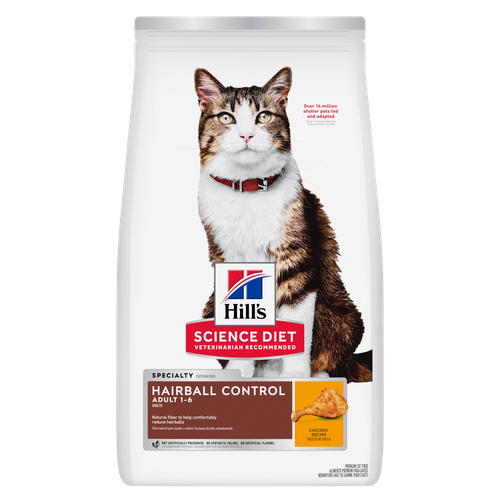
-
Find the right food for your petTake this quiz to see which food may be the best for your furry friend.Find the right food for your petTake this quiz to see which food may be the best for your furry friend.Health CategoryFeatured products
 Hill's Science Diet Adult Healthy Mobility Large Breed Chicken Meal, Barley & Brown Rice Recipe Dog Food
Hill's Science Diet Adult Healthy Mobility Large Breed Chicken Meal, Barley & Brown Rice Recipe Dog FoodAdvanced nutrition shown to support joint health and improve mobility
Shop Now Adult Perfect Digestion Chicken, Barley & Whole Oats Recipe Dog Food
Adult Perfect Digestion Chicken, Barley & Whole Oats Recipe Dog FoodScience Diet's breakthrough nutrition supports ultimate digestive well-being & healthy microbiome
Shop Now Adult Perfect Weight & Joint Support Chicken & Brown Rice Recipe Dog Food
Adult Perfect Weight & Joint Support Chicken & Brown Rice Recipe Dog FoodThis weight management and mobility support dog food was created with Hill’s unique understanding of the biology of overweight dogs.
Shop NowFeatured products Adult Perfect Digestion Chicken, Barley & Whole Oats Recipe Cat Food
Adult Perfect Digestion Chicken, Barley & Whole Oats Recipe Cat FoodHill's Science Diet's breakthrough nutrition supports ultimate digestive well-being & healthy microbiome
Shop Now Adult Hairball Control Chicken Recipe Cat Food
Adult Hairball Control Chicken Recipe Cat FoodNatural fibre comfortably reduces hairballs
Shop Now Adult Healthy Cuisine Roasted Chicken & Rice Medley Cat Food
Adult Healthy Cuisine Roasted Chicken & Rice Medley Cat FoodDelicious roasted chicken and rice in a mouthwatering sauce
Shop Now -
DogCat
- Cat Tips & Articles
-
Health Category
- Weight
- Skin & Food Sensitivities
- Urinary
- Digestive
- Kidney
- Dental
- Serious Illness
-
Life Stage
- Kitten Nutrition
- Adult Nutrition
Featured articles Water
WaterWater is the most important nutrient of all and essential for life. Animals can lose almost all their fat and half their protein and still survive, but if they lose 15% of their water, it will mean death.
Read More Fun Ideas for Kids and Pets This Summer
Fun Ideas for Kids and Pets This SummerOutdoor summer activities with your dog or cat can be fun for kids, too. Learn how they also teach kids responsibility & creates a bond with their pet.
Read More Tips on How to Store Your Dog or Cat Food Properly
Tips on How to Store Your Dog or Cat Food ProperlyWhere you store your cat and dog food can make a big difference in the quality and freshness once it is opened. Here are some common questions and recommendations for optimal storage for all of Hill’s dry and canned cat and dog food.
Read More -


Your dog is licking and scratching incessantly, and he's starting to lose his fur. Could he possibly have mange? While a number of conditions could be responsible for your dog's itching, it's important to arm yourself with the facts about dog mange. Mange is a condition that, while usually treatable, is sometimes contagious and has the potential to be serious. Keep reading to learn about mange in dogs and how you can help your itchy pup.
What Is Mange?
Generally speaking, mange is a skin condition caused by an infestation of mites, which are tiny parasitic arachnids that are closely related to ticks. There are two types of mange that affect dogs — demodectic mange, which is not contagious, and sarcoptic mange, which is.

- Demodectic mange. This type of mange is caused by infestations of the Demodex mite in your dog's skin and hair follicles, which is usually not serious. The truth is that humans and animals alike tend to have these mites clinging to their hair without noticing. Mange from these mites result either when the infestation becomes so great that they overwhelm your dog's immune system, or your dog's immune system is too weak to fend them off, which causes the skin at the follicle root to become inflamed, resulting in itching and hair loss. Demodectic mange is not contagious, is easily treatable in most cases, and typically only affects dogs that are sick or geriatric.
- Sarcoptic mange. This type of mange is caused by the Sarcoptes scabiei mite — the same mite that causes scabies in humans. These mites burrow under the skin, causing extreme itching. Hair loss with this type of mange is usually the result of a dog's incessant scratching and chewing rather than the mange itself. While sarcoptic mange is treatable, it's highly contagious and transmissible to humans and other pets. If your dog has this type of mange, he'll need to be quarantined and you will have to decontaminate your home.
Signs and Symptoms of Mange in Dogs
Signs that your dog could be suffering from mange include:
- Redness, rash, and itching
- Hair loss
- Sores and lesions
- Scabby, crusty or scaly skin
While both types of mange may cause hair loss all over, with demodectic mange the hair loss and itching is more commonly localized to small patches, typically located on the face, trunk and legs.
Diagnosing Dog Mange
Your veterinarian may perform a number of tests, including blood and urine tests, to rule out alternative causes of your dog's itching and hair loss, such as allergies or metabolic disorders. Skin scrapings and an examination of the hair follicles can help identify the presence of mange and which type of mite is causing it.


Tasty Tips
Treating Demodectic Mange
In many cases, demodectic mange clears up on its own. More severe cases may need to be treated long-term with medication and regular skin scrapings to monitor progress. For severe itching, treating your dog with a lime-sulfur dip (under the direction from your veterinarian) may provide relief. Because demodectic mange is an indication of a weak immune system, your vet might also take steps to identify and treat any underlying illnesses that might be compromising your dog's immunity.
Treating Sarcoptic Mange
Dogs with sarcoptic mange will need to be dipped repeatedly in scabicidal shampoo, usually once a week over a period of four to six weeks. This needs to be done under your vet's supervision and is not a treatment you can purchase over the counter to provide at home. Because some mites develop resistance to certain medications, some experimentation might be required to find an effective formula. Your vet might also prescribe oral or topical medications, and can advise you on helping strengthen your dog's immune system.
While your dog can be kept at home during the course of his treatment, because of the contagious nature of this type of mange he'll need to be quarantined away from other pets and family members. You'll need to wear gloves when handling him, and be sure to wash your hands thoroughly with soap and water afterward. You will also need to wash his bedding, as well as any other fabrics or surfaces he's come into contact with, including your own bedding and clothing, furniture, curtains, and carpets
If you come into contact with your dog while he's infected, you may develop a purplish rash on your arms or torso. This should clear up on its own once your dog has finished treatment. It's important to keep your dog as comfortable as possible during this time so that stress and anxiety won't weaken his immune system and reduce the effectiveness of his treatment.
Questions to Ask Your Vet
If you suspect that your pet might have mange, you should have your vet examine him right away. Ask your vet to do a skin scraping to identify whether mites are present as well as what type they are, so you'll know if you need to act fast to protect yourself and your loved ones from contagion. You should also ask your vet to rule out any alternative causes for your dog's skin problems, as well as any underlying conditions that might have weakened your dog's immune system. In addition to prescribing medications to kill the mites and treat your dog's symptoms, your vet might be able to advise you on any special dog food you can give your dog to help strengthen his immune system. And if your dog is diagnosed with demodectic mange, be sure to ask your vet what other complications could arise due to your dog's compromised immunity, and what you can do to help prevent or treat them.
Dog mange often looks scarier than it is, but that doesn't mean it's a condition that should be taken lightly. Besides the potential for contagion, it's important to remember that mange typically doesn't affect a strong, healthy adult dog. Treating your dog's mange might be the first step that leads to treatment of a more serious underlying condition — it could even end up saving your precious pet's life.


Jean Marie Bauhaus is a pet parent, pet blogger, and novelist from Tulsa, Oklahoma, where she usually writes under the supervision of a lapful of fur babies.
Related products

Hill's Science Diet Sensitive Stomach & Skin Large Breed dry dog food is gentle on stomachs while nourishing skin & promoting a lustrous coat. In a delicious large bite size for large breed dogs.

Advanced nutrition shown to support joint health and improve mobility

This weight management and mobility support dog food was created with Hill’s unique understanding of the biology of overweight dogs.

Science Diet's breakthrough nutrition supports ultimate digestive well-being & healthy microbiome
Related articles

Learn about choosing the right dog food to help ensure your mature older dog will receive the correct balance of nutrition.

Large breeds of dogs have different nutritional needs than smaller breeds. Learn more about the specific needs of large and giant breeds.

Learn what you can feed your pregnant or nursing dog to keep her and her new pups healthy.

Learn how today's wet dog food blends have gotten a face lift, and how you'll provide your dog the nutrition he needs in the form he loves.

Put your dog on a diet without them knowing
Our low calorie formula helps you control your dog's weight. It's packed with high-quality protein for building lean muscles, and made with purposeful ingredients for a flavorful, nutritious meal. Clinically proven antioxidants, Vitamin C+E, help promote a healthy immune system.
Put your dog on a diet without them knowing
Our low calorie formula helps you control your dog's weight. It's packed with high-quality protein for building lean muscles, and made with purposeful ingredients for a flavorful, nutritious meal. Clinically proven antioxidants, Vitamin C+E, help promote a healthy immune system.

